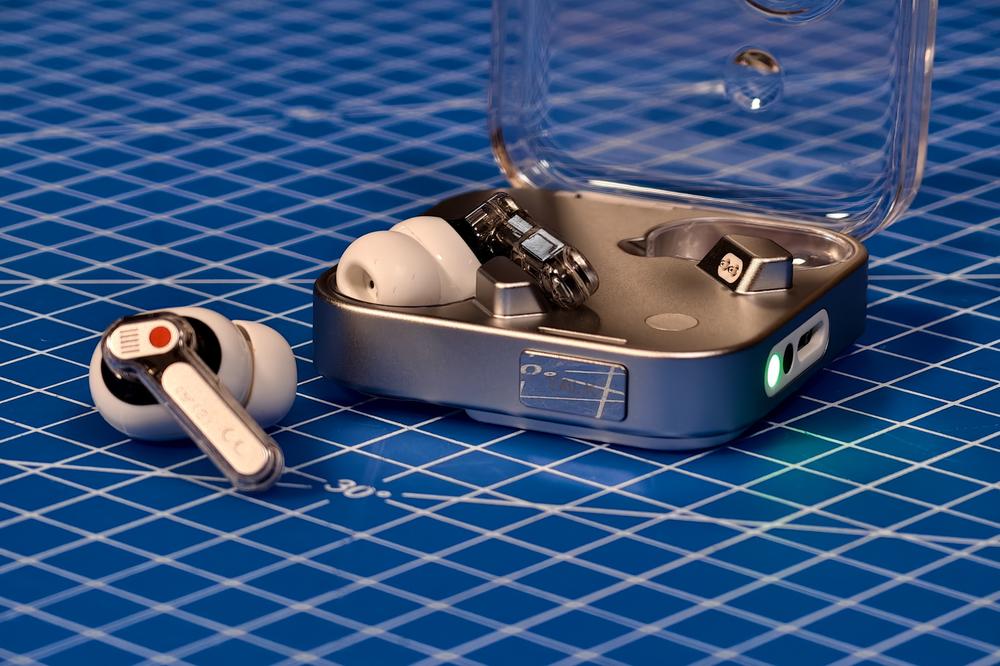Nothing’s Ear 3 buds remind me more than anything else of the Ear 1, the company’s first product. Not because the design is similar (though it is) or because the sound is similar (it’s gotten a fair bit better, in fact). No, I’m reminded of the Ear 1 because both sets of earbuds share a sense of invention, of boundaries pushed with mixed results.
In the Ear 1, that was the result of a new company making its first products, building earbuds that looked unlike anything else on the market but that suffered from hardware faults and software bugs at launch. In the Ear 3, it’s the new Super Mic, a novel directional microphone system built into the charging case that’s intended to deliver better audio quality for calls, voice notes, and AI assistant interactions. And it does — sometimes.
6
Verge Score
$ 179The Good
- Distinctive design
- Good audio
- Great value
The Bad
- Super Mic is inconsistent
- Average ANC
The $179 Ear 3 are, somewhat confusingly, Nothing’s fourth flagship earbuds, with the Ear 1 followed by the Ear 2 and then simply the Ear, which don’t seem to count anymore.
Super Mic is the big addition this time around, a first both for Nothing and for the rest of the earbud industry. The charging case has two built-in microphones, one along the side and one on the bottom, activated by an invitingly large “TALK” button.
A double press during a call toggles the case mic on and the earbud microphones off, or you can press and hold the button to activate Super Mic temporarily. Outside of a call, holding down the button serves as a shortcut to activate your smart assistant of choice. Importantly, none of this works unless at least one earbud is out of the case and connected to your phone — you can’t connect the case itself directly to your phone.
Nothing hasn’t detailed the specs of the microphones, though the two on the case certainly look bigger than those on the earbuds. It’s likely that a large part of the benefit comes from simple physics: A microphone held in front of your mouth will pick up better sound than one tucked back by your ear. This is the problem earbud manufacturers have grappled with ever since we all moved away from wired buds with inline mics, and Nothing’s approach is novel, if nothing else.
And it does sound better… some of the time. I’ve been baffled by the variability I’ve experienced while testing Super Mic, which sometimes sounds good enough to use for social media videos, and at other times sounds no better (or even worse) than the mics in the Ear 3 buds.
The problem, I think, comes down to the same directionality that gives Super Mic its advantage in the first place. Position the case just right, and the microphones record sound with more depth, warmth, and clarity than the earbuds themselves can offer. Hold it too far away, too close, pointing the wrong way, or with your hand blocking one of the mics, and quality drops dramatically. It means there’s a bit of a knack to using Super Mic, and if you’re hoping for better microphone quality while you leave voice notes on the go and gesticulate with abandon, this might not deliver.
Then there’s compatibility. Broadly speaking, Super Mic works anywhere that the regular earbud mics do. That means you can use it for voice and video calls, whether through your regular system phone app or the likes of WhatsApp, Zoom, or WeChat, and in iOS Voice Memos too. But it doesn’t work for video in the default camera apps on either iOS or most Android phones, so if you want to use it as a handheld mic on TikTok, you’ll need to use a third-party app like Blackmagic with the option to manually select the mic input. iOS 26 added the ability to select a microphone to use across any app, which should solve this problem at an OS level, but I couldn’t make the two features work together at all.
Perhaps because the case has to connect via Bluetooth to the earbuds, which then connect to the phone, Super Mic also suffers from lag. When I used it to record video in the Blackmagic app, I found my voice was out of sync with the final footage. It’s little enough lag that it won’t be an issue in voice calls, but it’s going to be a problem for any sort of video that you can’t just fix in post.
Testing Super Mic did at least confirm to me that Nothing’s noise cancellation for calls is pretty impressive, whichever set of mics you use. Standing a few feet away from a construction worker with a jackhammer, there wasn’t a hint of that noise in the final audio; the tradeoff is that my own voice was a little choppy, caught in the noise cancellation crossfire.
I’ve been less impressed by the noise canceling when using the buds to listen to audio, though it’s typical for this midrange price point. Whether out on the street, in the gym, or on the London Underground, anything from a little to a lot of background noise has filtered through every time. You’ll have to spend more than $180 to get total silence from a pair of wireless earbuds, I’m afraid — the Bose QuietComfort Ultra, our pick for the best noise-canceling buds right now, cost $299.
Audio quality is good otherwise. The feature set is exhaustive: LDAC Hi-Res audio, personalized sound profiles, customizable EQ, spatial audio, a low latency mode for gaming, and the option to stay connected to two devices via multipoint. The default tuning is punchy and bass-forward, but there are both three-channel and eight-channel EQ options, giving you the flexibility to find the sound that suits you. You can save multiple sound profiles, too, while a bass enhancement mode lets you crank up the low end even further.
Battery life is good, but unremarkable. Nothing says you’ll get about five and a half hours per charge with ANC on, jumping to 10 hours with ANC off, which has tracked with my usage. The case holds enough battery for an extra three charges, so you’re looking at a less impressive 22 hours of total ANC listening and 38 without noise cancellation. It takes a little over an hour to top the case up fully over USB-C, and two hours over wireless Qi charging.
Aesthetically, these don’t look too distinct from any of Nothing’s previous earbuds. The design language set by the Ear 1 is still here in force, with a mix of white, black, and transparent plastic found throughout. The biggest update is the inclusion of metal accents on both the earbud stems and the body of the charging case, intended to help with antenna performance and add a more premium feel. The aluminum definitely adds a welcome heft to the case, but these are still more plastic than anything else, so don’t expect them to feel radically different to what’s come before. Both earbuds and the case have an IP54 rating for dust and water resistance, though note that’s a slight downgrade from last year’s Nothing Ear, which had a higher IP55 rating on the charging case.
Super Mic aside, Nothing hasn’t added too much else to the Ear 3 when you compare them to their immediate predecessors, despite commanding a $30 higher price tag. Battery life is slightly improved, there’s a little extra metal around the place, and the spatial audio support is new too. But last year’s Ear were pretty great buds for the price, and the small upgrades here are enough to keep the Ear 3 competitive, even if I’d be more tempted to pick up the older pair while they’re still on sale.
But it all depends if Super Mic swings things for you. I love the idea, but for my money it’s still too much of a work in progress to be a good reason to buy the Ear 3 over other buds. But the Ear 4? They might end up being something special.
Photography by Dominic Preston / The Verge

 “Women should be madder”: Man spends 2 weeks researching women’s healthcare and can’t believe how broken it is
“Women should be madder”: Man spends 2 weeks researching women’s healthcare and can’t believe how broken it is